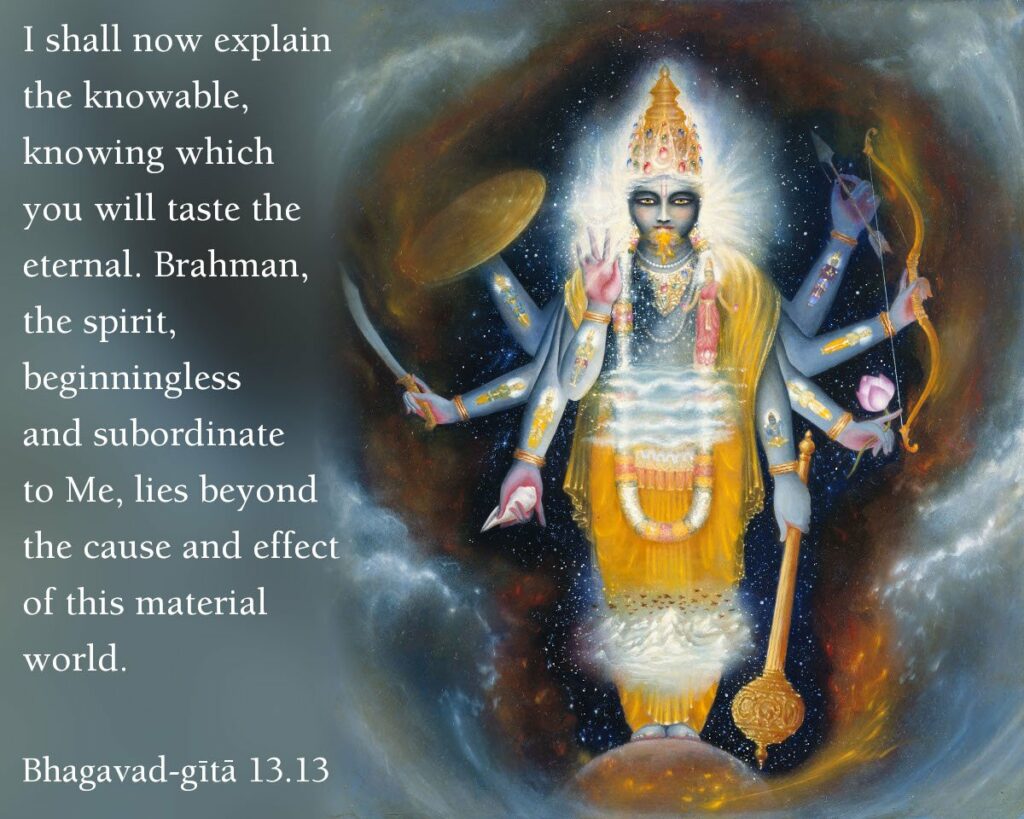ज्ञेयं यत्तत्प्रवक्ष्यामि यज्ज्ञात्वामृतमश्रुते |
अनादिमत्परं ब्रह्म न सत्तन्नासदुच्यते || 13||
jñeyaṁ yat tat pravakṣhyāmi yaj jñātvāmṛitam aśhnute
anādi mat-paraṁ brahma na sat tan nāsad uchyate
jñeyam—ought to be known; yat—which; tat—that; pravakṣhyāmi—I shall now reveal; yat—which; jñātvā—knowing; amṛitam—immortality; aśhnute—one achieves; anādi—beginningless; mat-param—subordinate to Me; brahma—Brahman; na—not; sat—existent; tat—that; na—not; asat—non-existent; uchyate—is called
Translation:
I will now describe that which ought to be known, through the knowing of which one attains Immortality. It is the Supreme Brahman, which is without beginning and is said to be neither being nor non-being.
Commentary:
From this verse onwards in six verses, the Lord explains the nature of that which is to be known, the supreme Brahman. The former verses (8-12) dealt with knowledge and its qualities. But that is not enough. Knowledge of what? What is it that the man of wisdom knows? What does knowledge lead to? What is that to be known? These questions are answered now by the Lord. Having abandoned bad qualities, the aspirant acquires good qualities, and then abandoning both, he attains the supreme Brahman. This is the state of perfection. All the other states are imperfect.
Some of the religions are content with the teaching of ethical principles and a moral code of conduct. It is good in itself, but that is not enough. The aspirant should purify himself by ethical conduct, and then find his identity with the Supreme. That is the ultimate goal. There is no resting ground anywhere below that state. Therefore in the Gita, the Lord takes his disciple to the highest rung of the spiritual ladder and leaves him there – the Advaita realisation of Nirguna Brahman. The Gita explains Dvaita Visishtadvaita and Advaita one after another and so it is said to be the one complete spiritual Sastra.
Pravakshyami: The enthusiasm of the Lord in this spiritual teaching is indicated by this word.
Amritam asnute: The reward of the Brahman is stated even at the beginning – the reward is Immortality. Knowing this, the seeker is inspired with zeal to move forward towards the goal – Immortality, Moksha, Perfection! That is the reward. Why should man cling to wretched perishable stuff and exhaust his precious life in animal activities, when there is Perfection awaiting him at the end of this ‘sadhana’?
nasaduchyate: The supreme Brahman is not an object of sense-perception. That is the idea of ‘na sat’ (non existence). It does not mean that it has non existence. A body exists and when it dies it ceases to exist. This is true of all objects. But Brahman is not said to exist or not exist in this sense. It is beyond existence and non-existence.
Sri Ramakrishna Says —
At four o’clock in the afternoon Mr. Mukherji, a relative of Prankrishna, arrived in the company of a brahmin well versed in the scriptures.
MUKHERJI: “I am very happy to meet you, sir.”
MASTER: “God dwells in all beings. He is the gold in all. In some places it is more clearly manifest than in others. God dwells in the worldly-minded, no doubt, but He is hidden there, like gold under deep layers of clay.”
MUKHERJI: “Sir, what is the difference between worldly and other-worldly things?”
MASTER: “While striving for the realisation of God, the aspirant has to practise renunciation, applying the logic of ‘Neti, neti’ — ‘Not this, not this’. But after attaining the vision of God, he realises that God alone has become all things.
“At one time Rama was overpowered by the spirit of renunciation. Dasaratha, worried at this, went to the sage Vasishtha and begged him to persuade Rama not to give up the world. The sage came to Rama and found him in a gloomy mood. The fire of intense renunciation had been raging in the Prince’s mind. Vasishtha said: ‘Rama, why should You renounce the world? Is the world outside God? Reason with me.’ Rama realised that the world had evolved from the Supreme Brahman. So He said nothing.
“Buttermilk is made from the same substance as butter. One who realises this knows that butter goes with buttermilk and buttermilk with butter. After separating the butter with great effort — that is to say, after attaining Brahmajnana — you will realise that as long as butter exists, buttermilk also must exist. Wherever there is butter there must be buttermilk as well. As long as one feels that Brahman exists, one must also be aware that the universe, living beings, and the twenty-four cosmic principles exist as well.
“What Brahman is cannot be described in words. Everything has been polluted, like food that has touched the tongue — that is, everything has been described in words. But no one has been able to describe Brahman. It is therefore unpolluted. I said this to Vidyasagar and he was delighted.
“But the Knowledge of Brahman cannot be realised if the aspirant is worldly-minded even in the slightest degree. He succeeds in acquiring this Knowledge only when his mind is totally free from ‘woman and gold’. Parvati once said to Her father, ‘Father, seek the company of holy men if you want the Knowledge of Brahman.'” (Source: Gospel of Sri Ramakrishna)
Bhagavad Gita: Chapter 13 🔻 (35 Verses)
